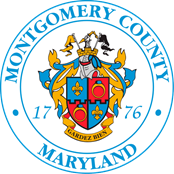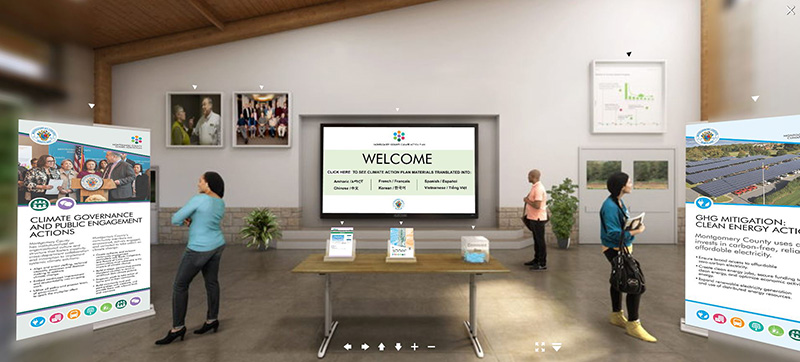Climate Action Planning
In July 2019, Montgomery County launched a planning process to develop prioritized actions and strategies to meet the County’s greenhouse gas (GHG) emissions reduction goals.
To kick off the climate planning process, the County convened several technical workgroups consisting of 150 community members, County and municipality staff. The workgroups, which have concluded, developed 894 recommendations. In April 2020, the County executed a contract with a consultant team for the analysis and modeling phase of the Climate Action Plan. The public provided input at multiple phases of the climate planning process.
The County finalized a Climate Action Plan in June 2021 that provides a roadmap to achieve zero emissions and provide recommendations for adapting to a changing climate. A Climate Action Plan Timeline is provided below.

Climate Action Planning Milestones
The County formed six technical climate workgroups—made up of County volunteers with area-specific expertise—focused on buildings, clean energy, transportation, climate adaption, carbon sequestration, and public engagement and education. Each workgroup developed and submitted recommendations to reduce GHG emissions while promoting equity.
Technical analysis and modeling to inform the Climate Vulnerability Assessment, priority actions, and CAP development.
The County connected with over 1,000 participants during 24 outreach events and received over 500 pages of written comments.
Draft CAP for Public Review News Release
Public Review of Workgroup Recommendations. The public reviewed the workgroup recommendations.
Organizations that serve vulnerable populations in the County engaged in a two-part workshop to share insights on racial equity, social justice, and climate change.
Final Climate Action Plan released in June 2021.
Climate Technical Workgroups
Roughly half of all measured GHG emissions in Montgomery County come from energy use in buildings. Increasing the energy efficiency of new and existing buildings is critical to meeting the County’s climate goals. However, this is unlikely to occur without requirements for, and incentives to encourage, buildings to reduce energy use. This workgroup identified innovative strategies and developed recommendations related to building codes, benchmarking, energy efficiency, building energy performance standards, auditing, and retrocommissioning.
While energy efficiency and conservation are the first step in reducing GHG emissions from homes and buildings, installing renewable energy in Montgomery County is the next step towards reducing fossil-fuel-based energy use. Opportunities exist in the County for expanded use of solar photovoltaic, solar hot water heating, and geoexchange energy systems. Opportunities also exist for greening the energy that is supplied through the electrical grid by utilities. This workgroup developed recommendations for greening the energy supply and expanding the use of distributed renewable energy in the County.
Climate change has created new weather patterns. In Montgomery County, this is most evident in the frequency of rainfall events that, coupled with historical development patterns, create flooding and drainage issues. This workgroup developed recommendations for reducing the County’s climate change vulnerability and strengthening the County’s ability to prepare for and withstand threats (known as hazard mitigation). Other topics for exploration include the effect of periods of high heat on vulnerable populations, the reliability of the electric grid and the reliability of public infrastructure. The workgroup also developed recommendations for carbon sequestration, which is the process of removing carbon from the atmosphere and storing it (such as in soil through tree planting or regenerative agriculture).
From time to time, the County may host forums for Climate Workgroup members to share information about issues and recommendations that cross multiple workgroup topics.
Engaging the public regarding climate change and the County’s aggressive climate goals is vital to the success of all other County efforts. If the public does not understand the issues the County is trying to address, and the policies and programs that may be put in place, the County’s GHG reduction efforts will not reach their full potential. This workgroup identified opportunities to communicate with and educate residents about the urgency of taking climate action; advised on effective communications strategies for engagement with diverse audiences; identified partners and linkages to other issues that people care about (such as public health); identified and promoted resources that people can use to reduce GHG emissions and adapt to a changing climate at the household level; and identified mechanisms to conduct on-going “climate conversations” with residents.
The transportation sector accounts for 41% of all greenhouse gas emissions generated in Montgomery County. While the overall fuel efficiency of the vehicle fleet has increased in recent years, the adoption of hybrid electric and all electric vehicles is still relatively small. This Workgroup identified opportunities to increase the use of electric vehicles in the County, as well as the availability of electric vehicle charging infrastructure. This Workgroup also reviewed ongoing County initiatives underway to increase the amount of personal travel accomplished by public transit and other low/no emissions modes, and identified other innovative strategies to reduce emissions in the transportation sector.
Climate Workgroup Meetings On-Demand
- Download the presentation from the technical workgroups kick-off meeting held on July 24, 2019 at the Silver Spring Civic Building.
- Consultant kick-off session recording with Workgroup members (Buildings & Clean Energy session), June 10, 2020
- Consultant kick-off session recording with Workgroup members (Adaptation & Sequestration session), June 11, 2020
- Consultant kick-off session recording with Climate Workgroup members (Transportation & Public Engagement session), June 22, 2020
- Consultant check-in meeting recording, September 10, 2020

